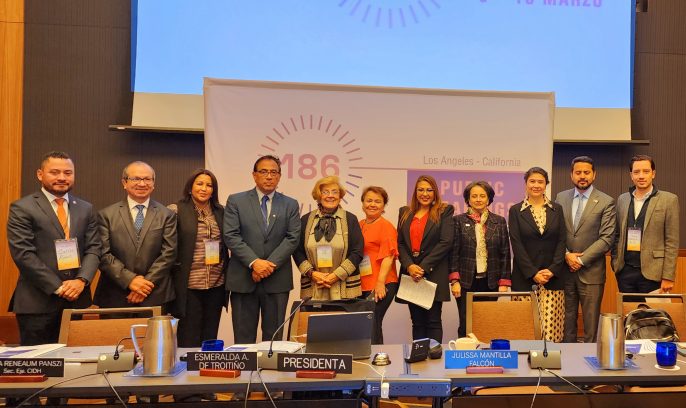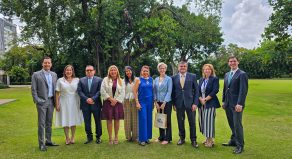This website uses cookies so that we can provide you with the best user experience possible. Cookie information is stored in your browser and performs functions such as recognising you when you return to our website and helping our team to understand which sections of the website you find most interesting and useful.
Institutional Integrity

The Institutional Integrity Program pursues transparency and integrity in government, supporting civil society, judicial independence, and intersecting efforts to hold officials and institutions accountable.
Through this program, we collaborate with civil society organizations promoting openness, transparency, and accountability. The Vance Center sees corruption as one of the main challenges for institutional integrity and the enjoyment of human rights and emphasizes the responsibility of the legal community to prevent, address and redress corruption. Through this program, we lead efforts to strengthen anti-corruption mechanisms, including improving legislation and public policy, enforcement, and capacity building of the legal community in this matter.
We also support initiatives and organizations supporting judicial independence and integrity as key components of the rule of law, including various judicial associations in Latin America and the U.N. Special Rapporteur on the Independence of Judges and Lawyers.
We recognize that the judiciary is a key institution for protecting and advancing the rule of law, which also makes it a target for corrupt actors and regimes striving to concentrate power and assert their will.
The Vance Center supports judicial independence and addresses obstructions to the rule of law by equipping justice operators with tools to push back against corruption and attacks on their independence and protect themselves and their colleagues from threats. We mobilize our team of in-house lawyers and our global network of legal partners to respond to emerging needs at the national and regional levels and strengthen the capacity of and increase resources for independent judges, lawyers and other participants in the justice system to ensure their independence and integrity.
We consistently engage the international justice community in this critical work, building toward a robust global network of anti-corruption actors and independent justice defenders. Recognizing their essential role in ensuring accountability, we prioritize supporting civil society organizations facing threats from closing civic space.
Our Lawyers Council for Civil and Economic Rights, which convenes private-practice attorneys across the Americas to work together on these issues, provides important insight and leadership for these initiatives.
Clients and Partner Organizations
New Projects
Judicial Independence
Our judicial independence work addresses threats to the independence, transparency, and integrity of Latin America’s judiciary by directly supporting independent judicial associations and their members....
Read moreJudicial Independence
The judiciary is a key institution for protecting and advancing the rule of law, making it a target for corrupt actors striving to concentrate power and assert their will. These actors rely on varied tactics that damage public trust in institutions, limit the effectiveness of the judicial system, and erode access to justice.
In Latin America, landmark efforts to combat emblematic corruption cases and develop independent, transparent, and ethical justice practices have recently faltered. Many countries are experiencing attacks on judicial independence: these include overt actions like criminal persecution and arrests of prosecutors and judges, and more subtle efforts to undermine judges like budget reductions and changes to retirement requirements. These threats warrant a response from the entire legal community, as they significantly impact the rule of law and fundamental rights.
Our judicial independence work addresses threats to the independence, transparency, and integrity of Latin America’s judiciary by directly supporting independent judicial associations and their members. We also engage our global network of legal professionals, emphasizing their responsibility to uphold the rule of law and integrity of legal institutions.
The project strengthens the associations’ institutional capacities, advocacy and defense efforts, external communications, and regional and international networks. Beyond this critical direct support, it contributes to strengthening accountability mechanisms within the judiciary, helping combat corruption and fostering more effective communication between the judiciary and society through enhanced public trust.
Judicial Independence Assessments
Since 2022, we have produced a series of assessments of judicial independence in 15 Latin American countries, in coordination with national judicial associations, regional entities Federación Latinoamericana de Magistrados (FLAM) and the Federación Centroamericana de Juezas y Jueces por la Democracia (FECAJUD), law firms, and other partners. These assessments are regularly updated to ensure they remain relevant.
See the latest updates:
- All Latin America
- Regional: Central America (Spanish and English)
Under this project, the Vance Center has also collaborated with FLAM and FECAJUD to host workshops on key issues related to judicial independence, submitted cases and organized hearings through the Inter-American human rights system, and convened regional events for judges across Latin America. These events have created spaces for judges to connect and share concerns and best practices, and produced practical outputs including manuals and expert reports. they have hosted workshops on topics including defending judicial independence in the inter-American and universal human rights systems and international financial compliance. Their regional events have convened judges and lawyers from dozens of countries for open dialogue about threats and best practices, encouraging durable collaboration and roadmaps to confront shared obstacles.
Impact and Outcomes
Through this initiative, we have:
-Advanced the case of exiled Guatemalan judge Erika Aifán before the IACHR. This included the addition of 13 exiled justice operators’ testimonies in 2023 and an expert report by a former UN Special Rapporteur.
-Organized an IACHR hearing at which judges from six countries presented about attacks on judicial independence and called on the IACHR to engage with governments on these issues.
-Produced 21 reports on judicial independence, which have been used for advocacy in 16 countries.
-Hosted 25 events to share report findings and recommendations, attended by over 1,000 people.
-The IACHR and UN Special Rapporteur on the Independence of Judges and Lawyers cite their work on specific country contexts.
-Convened judges from 17 countries for cross-national conversations on judicial independence matters.
-Produced a manual with 25 actionable recommendations resulting from a series of convenings in 2023.
Latin America Anti-Corruption Assessment
This unique regional study examines seventeen countries and maps legal efforts to prevent and combat corruption....
Read moreLatin America Anti-Corruption Assessment
This unique regional study examines seventeen countries and maps legal efforts to prevent and combat corruption. Unlike other studies that focus on measuring corruption or perceptions of corruption, this assessment uses legal practice as a basis to analyze legislation and practices to prevent, punish and combat corruption. This document captures the views of anti-corruption practitioners in various sectors, including law firms, companies, academia, civil society organizations, and human rights defenders, among others.
Corruption and Migration
The Vance Center worked with Derechos Humanos & Litigio Estratégico Mexicano to produce a report and guide for migrants in Mexico to report corruption....
Read moreCorruption and Migration
The Vance Center worked with Derechos Humanos & Litigio Estratégico Mexicano to produce a report and guide for migrants in Mexico to report corruption. Throughout Latin America, migrants are a vulnerable population group and one of the most impacted by corruption. This is especially relevant in Mexico, a key transit country for migrants moving through the region. This comparative study presents the legal framework for the human rights of migrants, whistleblower protection, and mechanisms for reporting corruption. The report identifies clear examples of abuses and human rights violations, collects testimonies documenting clear cases of systematized corruption, provides information on existing hotlines and other options for internal and external whistleblowers, and offers detailed information on their protection.
Read the report in Spanish here.
Comparative Analysis of Universal Jurisdiction
This comparative analysis examines the legal provisions that would allow filing criminal complaints regarding crimes that could be pursued through universal jurisdiction in Argentina, Chile, Colombia, Costa Rica, Mexico, Panama, Peru, and Uruguay....
Comparative Analysis of Universal Jurisdiction
This comparative analysis examines the legal provisions that would allow filing criminal complaints regarding crimes that could be pursued through universal jurisdiction in Argentina, Chile, Colombia, Costa Rica, Mexico, Panama, Peru, and Uruguay. Universal Jurisction provides an opportunity to bring the perpetrators to justice, even if their country of origin is unwilling or unable to conduct the investigation and prosecution, and provides a measure of reparation for victims and their families. At the same time, the use of universal jurisdiction sends a clear message to perpetrators of serious crimes that they cannot evade accountability for their actions, no matter where they are.
The executive summary and analysis are available in English here, and the full report is in Spanish here.
New Projects
Judicial Independence
Our judicial independence work addresses threats to the independence, transparency, and integrity of Latin America’s judiciary by directly supporting independent judicial associations and their members....
Read moreJudicial Independence
The judiciary is a key institution for protecting and advancing the rule of law, making it a target for corrupt actors striving to concentrate power and assert their will. These actors rely on varied tactics that damage public trust in institutions, limit the effectiveness of the judicial system, and erode access to justice.
In Latin America, landmark efforts to combat emblematic corruption cases and develop independent, transparent, and ethical justice practices have recently faltered. Many countries are experiencing attacks on judicial independence: these include overt actions like criminal persecution and arrests of prosecutors and judges, and more subtle efforts to undermine judges like budget reductions and changes to retirement requirements. These threats warrant a response from the entire legal community, as they significantly impact the rule of law and fundamental rights.
Our judicial independence work addresses threats to the independence, transparency, and integrity of Latin America’s judiciary by directly supporting independent judicial associations and their members. We also engage our global network of legal professionals, emphasizing their responsibility to uphold the rule of law and integrity of legal institutions.
The project strengthens the associations’ institutional capacities, advocacy and defense efforts, external communications, and regional and international networks. Beyond this critical direct support, it contributes to strengthening accountability mechanisms within the judiciary, helping combat corruption and fostering more effective communication between the judiciary and society through enhanced public trust.
Judicial Independence Assessments
Since 2022, we have produced a series of assessments of judicial independence in 15 Latin American countries, in coordination with national judicial associations, regional entities Federación Latinoamericana de Magistrados (FLAM) and the Federación Centroamericana de Juezas y Jueces por la Democracia (FECAJUD), law firms, and other partners. These assessments are regularly updated to ensure they remain relevant.
See the latest updates:
- All Latin America
- Regional: Central America (Spanish and English)
Under this project, the Vance Center has also collaborated with FLAM and FECAJUD to host workshops on key issues related to judicial independence, submitted cases and organized hearings through the Inter-American human rights system, and convened regional events for judges across Latin America. These events have created spaces for judges to connect and share concerns and best practices, and produced practical outputs including manuals and expert reports. they have hosted workshops on topics including defending judicial independence in the inter-American and universal human rights systems and international financial compliance. Their regional events have convened judges and lawyers from dozens of countries for open dialogue about threats and best practices, encouraging durable collaboration and roadmaps to confront shared obstacles.
Impact and Outcomes
Through this initiative, we have:
-Advanced the case of exiled Guatemalan judge Erika Aifán before the IACHR. This included the addition of 13 exiled justice operators’ testimonies in 2023 and an expert report by a former UN Special Rapporteur.
-Organized an IACHR hearing at which judges from six countries presented about attacks on judicial independence and called on the IACHR to engage with governments on these issues.
-Produced 21 reports on judicial independence, which have been used for advocacy in 16 countries.
-Hosted 25 events to share report findings and recommendations, attended by over 1,000 people.
-The IACHR and UN Special Rapporteur on the Independence of Judges and Lawyers cite their work on specific country contexts.
-Convened judges from 17 countries for cross-national conversations on judicial independence matters.
-Produced a manual with 25 actionable recommendations resulting from a series of convenings in 2023.
Latin America Anti-Corruption Assessment
This unique regional study examines seventeen countries and maps legal efforts to prevent and combat corruption....
Read moreLatin America Anti-Corruption Assessment
This unique regional study examines seventeen countries and maps legal efforts to prevent and combat corruption. Unlike other studies that focus on measuring corruption or perceptions of corruption, this assessment uses legal practice as a basis to analyze legislation and practices to prevent, punish and combat corruption. This document captures the views of anti-corruption practitioners in various sectors, including law firms, companies, academia, civil society organizations, and human rights defenders, among others.
Corruption and Migration
The Vance Center worked with Derechos Humanos & Litigio Estratégico Mexicano to produce a report and guide for migrants in Mexico to report corruption....
Read moreCorruption and Migration
The Vance Center worked with Derechos Humanos & Litigio Estratégico Mexicano to produce a report and guide for migrants in Mexico to report corruption. Throughout Latin America, migrants are a vulnerable population group and one of the most impacted by corruption. This is especially relevant in Mexico, a key transit country for migrants moving through the region. This comparative study presents the legal framework for the human rights of migrants, whistleblower protection, and mechanisms for reporting corruption. The report identifies clear examples of abuses and human rights violations, collects testimonies documenting clear cases of systematized corruption, provides information on existing hotlines and other options for internal and external whistleblowers, and offers detailed information on their protection.
Read the report in Spanish here.
Comparative Analysis of Universal Jurisdiction
This comparative analysis examines the legal provisions that would allow filing criminal complaints regarding crimes that could be pursued through universal jurisdiction in Argentina, Chile, Colombia, Costa Rica, Mexico, Panama, Peru, and Uruguay....
Comparative Analysis of Universal Jurisdiction
This comparative analysis examines the legal provisions that would allow filing criminal complaints regarding crimes that could be pursued through universal jurisdiction in Argentina, Chile, Colombia, Costa Rica, Mexico, Panama, Peru, and Uruguay. Universal Jurisction provides an opportunity to bring the perpetrators to justice, even if their country of origin is unwilling or unable to conduct the investigation and prosecution, and provides a measure of reparation for victims and their families. At the same time, the use of universal jurisdiction sends a clear message to perpetrators of serious crimes that they cannot evade accountability for their actions, no matter where they are.
The executive summary and analysis are available in English here, and the full report is in Spanish here.




